
President Obama
The White House threatened to veto a defense bill Tuesday night, objecting to a provision that imposes "onerous" restrictions on the president's ability to move detainees from the military prison at Guantanamo Bay The veto threat was the 27th so far this year, and President Obama remains on pace to issue more veto threats to this Congress than any president since the Reagan administration formalized the practice. He's made good on two of those veto threats so far this year.
Obama has threatened to veto similar Guantanamo provisions in the past. Instead, he signed those bills, but with a signing statement maintaining that Congress had no authority to prevent him from exercising his power as commander-in-chief to release enemy combatants.
And that's what he did last year, releasing of five Taliban commanders in exchange for Bowe Bergdahl, an Army sergeant now charged with desertion. The Government Accountability Office says the Obama administration violated the law by failing to give Congress 30 days notice of the release.
Obama has long lobbied Congress for more authority to close the Guantanamo Bay facility. In the statement of administration policy released Tuesday night, the Office of Management and Budget said the defense bill goes even further than previous bills blocking that action.
"The restrictions contained in this bill are unwarranted and threaten to interfere with the Executive Branch's ability to determine the appropriate disposition of detainees and its flexibility to determine when and where to prosecute them, based on the facts and circumstances of each case and our national security interests, and when and where to transfer them consistent with our national security and our humane treatment policy," OMB said in the statement. But the White House also played a constitutional trump card, maintaining that the detainee provisions could "violate constitutional separation-of-powers principles" and "interfere with a detainee's right to the writ of habeas corpus."
The White House also expressed objections to at least 35 other other pro visions in the bill that would:
• Block funding for another round of military base closures and consolidations.
• Circumvent the government of Iraq in providing funding to groups battling the Islamic State.
• Require that the Defense Department install anti-ballistic missile sites in Poland and Romania by 2018.
• Restrict the use of alternative fuels by the military.
• Block the retirement of the A-10 attack aircraft, which the administration wants to replace with the Joint Strike Fighter.
• Give governors more greater command and control over their national guard units;
• Spend almost $4 billion on weapons systems the president says are unnecessary.
The House is scheduled to vote on the defense authorization bill this week.
.gif)








0 comments:
Post a Comment